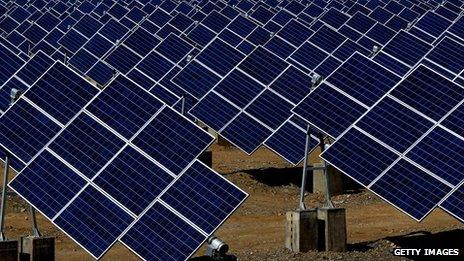China solar panel duties imposed by EU
- Published

The anti-dumping case is the biggest undertaken by the European Commission
The European Commission has announced it is imposing temporary anti-dumping levies on Chinese solar panel imports.
It comes despite opposition from Germany and other European Union members, and amid fears it could spark a trade war.
The Commission - the EU's executive arm - argues that Chinese firms are unfairly undercutting rivals.
EU trade commissioner Karel De Gucht has said Chinese panels are being sold below cost and damaging competition.
The measures come into force on Thursday, 6 June, in all of the bloc's 27 member states.
The duties will be phased in gradually. Initially they will average 11.8% - less than originally proposed.
They will only reach an average of 47.6% after two months, if no compromise with China can be found.
Also, if negotiations fail to resolve the dispute, the provisional duties will become permanent for five years from December.
Mr De Gucht said the price at which the Chinese panels are sold in Europe should be 88% higher, according to the Commission's calculations.
"It has the potential to destroy an important industry in Europe if we don't act today,'' he said.
Mr De Gucht added that the duties now provide an incentive for the Chinese to negotiate.
"It provides a clear window of opportunity for negotiations, but the ball is now in China's court," he said.
German complaint
Under EU law, such provisional tariffs provide the option for a negotiated solution, such as reaching agreement on a minimum price at which Chinese producers can sell solar panels in Europe.
China is the world's largest producer of solar panels. Its exports of them to Europe totalled 21bn euros ($27bn; £18bn) in 2011.
The anti-dumping case is the biggest ever undertaken by the Commission.
The Chinese government warned the European Union last month that if Brussels went ahead with provisional duties, it would "take necessary steps" to defend its national interest.
However, it didn't specify exactly what the measures would be.
It was a German company, Solar World, which first raised the complaint against China.
- Published27 May 2013
- Published16 May 2013
- Published8 May 2013